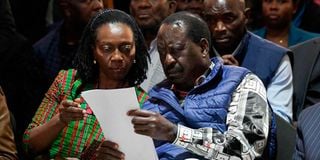Premium
A coup, shifting gears and why Azimio is falling apart

Kenya's Azimio La Umoja Party (One Kenya Coalition Party) presidential candidate Raila Odinga and his running mate Martha Karua look at a document at the Milimani High Court in Nairobi on August 22, 2022.
What you need to know:
- The political organisational juggernaut called Azimio was held together and propelled by Uhuru Kenyatta as a political force.
- With Kenyatta's presidential force close to nil, Azimio is not only immobile, but it is also falling apart.
- Entities that had been impelled into Azimio by the threat of violent state power now enjoy illimitable political freedom.
There are four things that, mentioned together, instigate extreme discomfort in Kenyan politics: a month, a year, an event and an organisation.
August 1982 coup and the Kenya Airforce. They are elements of a traumatic national taboo that has been assiduously mined by disparate constituencies for devastating political capital.
More confounding are the paradoxes spawned by that moment of abysmal madness: its villains are yet hopeless romantics, and its heroes, uttermost cowards, whilst the rest of us ebb and flow between pillar and post with resolute indeterminacy.
In keeping with the psychic oscillation ordained by the occasion, this is both about, and entirely not about August 1982, the coup and the Kenya Airforce.
When the dust settled on that desperately doomed affair, the airforce had been disbanded, and its officers rehabilitated and re-skilled in wholly new, innocuous, apolitical and perfectly non-martial disciplines.
A good number of them became very brilliant schoolteachers, and this is why I am talking about the coup.
Now I had the good fortune to be taught, for the most part, by highly qualified, remarkably committed, talented and excellent teachers, as I would imagine, you did.
Even so, the most remarkable of them have to be the new teachers who materialised in the mid-80s, quiet, firm, knowledgeable and discreet.
One of them was an aircraft engineer who disappeared after the coup, only to materialise as one of my greatest teachers ever.
Samuel Lagat was a prodigious all-rounder inside the school and a stern, silent, crisp enigma outside it.
When I joined Alliance High School, C. S Khaemba had just been promoted to deputise the insuperable legend M. K. Wagitu, and the place was humming like a high-bypass, turbofan Rolls-Royce Trent aircraft engine.
Our careers master was Murigi Mbugua, a maths and physics ace, just like Khaemba.
Both Khaemba and Mbugua were former airforce pilots. Khaemba was a clipped, serious, earnest, hyper-organised and sports-obsessed master whose valiant attempts to suppress his military bearing not only backfired but actually seemed to incite the soldier within
Dry humour was his forte, and it was difficult to forget anything he ever taught. He did not suffer fools gladly, and his extremely high reactivity was legendary.
In fact, the S in his name was famously repurposed to stand for Sodium; we learnt later that it stands for Situma, meaning that in another life he would have been a formidable Bukusu warrior.
Mbugua was the anti-Khaemba. Breezy, prone to humming as he ambled energetically by, loquacious with a vivid turn of phrase, he reminded me of Shakespeare’s Mercutio.
He enjoyed being a civilian overmuch, and I later discovered that his febrile enthusiasm for trigonometry and projectile motion was not a vain acquisition from secondary sources. Conversation with Mbugua consisted of maths or physics exam questions.
“Young man, for example, let us say you are from Aggrey. And let us assume you are lazy. A lazy boy from Aggrey is travelling at the speed of….”
Classical mechanics
It was Khaemba who introduced us to the greatness of Isaac Newton, and gave us an overview of Principia Mathematica.
His aim was to ease us into the famous laws of classical mechanics.
The Third Law is very well known and everybody from drunkards, to politicians, to drunk politicians- knows how to deploy it as a threat: for every action, there is an equal and opposite reaction.
The effect is astounding when sternly delivered without further exposition.
The First Law is the slightly less known law of inertia, which really is why we got into this whole story.
If a body is at rest or is moving at a constant speed in a straight line, it will remain thus at rest or in such motion, unless it is acted upon by a force.
This force is described in the second law as being equal to the product of mass and acceleration.
In any event, the apparent behaviour and other characteristics of an entity can be dominated by the presence and actions of another entity.
Azimio juggernaut
The political organisational juggernaut called Azimio was held together and propelled by Uhuru Kenyatta as a political force.
To be such a force, Kenyatta was not just an arch-politico, he was the President in full incumbency, commanding the levers of the state and able to move earth and heaven to express his will.
An election happened on August 9, followed by the declaration of William Ruto as president-elect.
This event instantaneously downgraded Kenyatta into temporary incumbency under Article 134.
In other words, with his presidential force close to nil, Azimio is not only immobile, but it is also falling apart.
By design, Azimio substituted Kenyatta’s presidential power for internal equilibrium.
Entities that had been impelled into Azimio by the threat of violent state power now enjoy illimitable political freedom.
Sans force, Azimio resumes its state of rest or motion at constant speed in a straight line: it is neither coming, nor going.
Mr Ng’eno is an Advocate of the High Court of Kenya and a former State House speech writer. @EricNgeno





